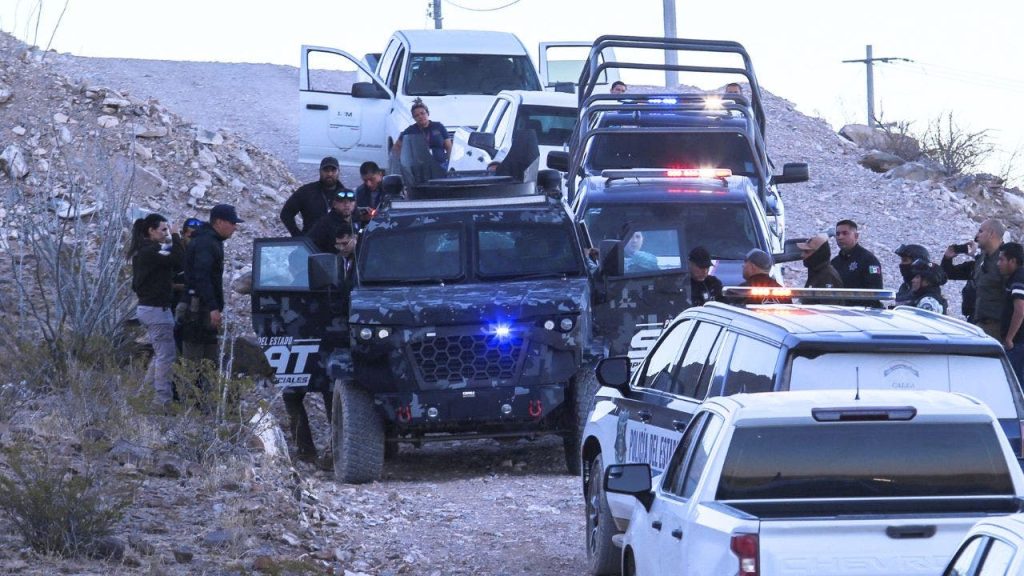The tragic death of a Mexican immigration agent near the U.S.-Mexico border has cast a harsh spotlight on the escalating tensions and dangers surrounding migration in the region. Luis Alberto Olivas García, a 30-year veteran of the National Migration Institute, was killed after requesting identification documents from a group of migrants at a checkpoint south of Ciudad Juarez, Chihuahua. Three individuals, two Venezuelan nationals and one Colombian, were subsequently arrested in connection with the agent’s death. Initial reports indicate that Olivas García suffered multiple wounds, potentially from a sharp weapon, and a fatal head injury, possibly inflicted with a rock. This incident marks a stark reminder of the risks faced by immigration officials working on the front lines of the migration crisis. While it is relatively uncommon for agents to be targets of violence, this incident serves to underscore the vulnerabilities within the system and the complex dynamics between immigration authorities and those seeking entry into the United States.
The timing of this incident is particularly poignant, occurring against the backdrop of a massive influx of migrants hoping to cross into the U.S. Many are driven by fears of an impending crackdown on illegal crossings anticipated with the changing political climate and tougher immigration policies promised by then-President-elect Trump. The incident near Ciudad Juarez coincided with reports of long lines forming outside immigration offices in southern Mexico, as hundreds of U.S.-bound migrants sought to secure safe passage north. This surge in migration further complicates the situation on the border, putting immense pressure on resources and personnel, and potentially contributing to heightened tensions and the likelihood of confrontations. The intersection of these factors – a surge in migration, stricter border enforcement policies, and the inherent dangers faced by both migrants and officials – creates a volatile environment susceptible to incidents like the tragic death of Agent Olivas García.
The killing of Olivas García has sparked outrage and grief, highlighting the human cost of the ongoing migration crisis. The agent, recognized earlier that same day for his three decades of service, was a seasoned veteran of the immigration service, and his death represents a significant loss for the agency and the community. The circumstances surrounding his death raise questions about the adequacy of safety measures for immigration officials operating in often challenging and unpredictable environments. The incident also underscores the need for comprehensive and humane solutions to address the root causes of migration and to provide safe and legal pathways for those seeking refuge or opportunity.
The incident also brings to the forefront the complex and multifaceted nature of the migration crisis. While the focus in this instance is on the tragic death of an immigration agent, it’s important to remember the plight of the migrants themselves, many of whom are fleeing desperate circumstances in their home countries. They are often vulnerable to exploitation, violence, and hardship as they navigate the perilous journey north. The circumstances surrounding the attack on Agent Olivas García remain under investigation, and it is crucial to avoid hasty generalizations or assigning blame to entire groups based on the actions of a few individuals. A comprehensive understanding of the context and motivations behind this tragic event is necessary to develop effective strategies for preventing similar incidents in the future.
The broader context of this incident involves the unprecedented levels of migration witnessed at the U.S.-Mexico border, particularly during the Biden-Harris administration. The influx of migrants seeking entry has strained resources and fuelled political debates regarding border security and immigration policy. The incoming Trump administration’s commitment to strengthening border security and implementing stricter immigration enforcement measures, including mass deportations, likely contributed to the surge in migrants attempting to cross the border before these policies took effect. This complex interplay of political factors, economic pressures, and human desperation forms the backdrop against which the killing of Agent Olivas García occurred, underscoring the urgency of finding lasting solutions to the migration crisis.
Moving forward, this incident serves as a stark reminder of the need for a multi-pronged approach to address the challenges of migration. This includes加强 border security measures to protect both migrants and officials, enhancing resources and training for immigration personnel, and addressing the root causes of migration through international cooperation and economic development initiatives. Most importantly, it calls for a more humane and compassionate approach to immigration policy that recognizes the dignity and human rights of all individuals, regardless of their immigration status. The tragic death of Agent Olivas García underscores the need for a balanced and comprehensive approach that prioritizes both security and human rights in addressing the complexities of migration at the U.S.-Mexico border.

